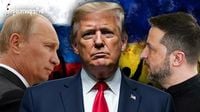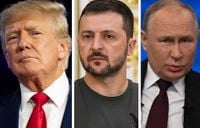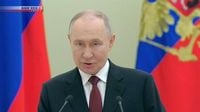In a significant shift in U.S. foreign policy, President Donald Trump and Secretary of State Marco Rubio announced on April 18, 2025, that the United States may withdraw from its role in mediating peace talks between Russia and Ukraine if no progress is made in the coming days. Trump emphasized the urgency of the situation, stating, "We want to get it done as quickly as possible." He warned that if either side complicates negotiations for any reason, the U.S. would reconsider its involvement, expressing frustration with the current state of talks.
Rubio, who is poised to take on the role of Secretary of State under a Trump administration, echoed these sentiments, indicating that Russia and Ukraine have only a few days left to show tangible progress. "We will not tolerate this effort for weeks or months longer," he said during a meeting with European leaders in Paris. He suggested that if substantial movement towards a resolution does not occur soon, Trump might reach a breaking point.
While Trump declined to set a specific deadline, he affirmed that both he and Rubio are eager for a resolution. When pressed by reporters on whether Russian President Vladimir Putin is the obstacle to progress, Trump responded, "I hope that’s not the case." This comes in light of recent admissions from Trump’s aides that the chances of achieving a swift peace agreement are dwindling.
European diplomats perceive Rubio's comments as indicative of a waning patience within the White House regarding Russia's lack of cooperation in ending the conflict. Dmitry Peskov, the Kremlin spokesperson, countered these claims, asserting that discussions have made some progress, although engaging with Washington has proven challenging. He maintained that Russia is keen to resolve the conflict while safeguarding its interests.
Complicating matters further, Ukrainian President Volodymyr Zelensky has publicly accused Trump’s special representative, Steve Witkoff, of propagating Russian narratives, a statement that U.S. officials believe undermines the negotiation process. Should the U.S. withdraw from its mediating role, experts warn that the peace process could collapse entirely, as no other nation possesses the leverage over both Moscow and Kyiv that the U.S. does.
In a related development, reports have surfaced indicating that the U.S. might be willing to accept Russia's control over Crimea as part of a broader peace agreement. Bloomberg cited sources revealing that this concession could be pivotal in coaxing Russia back to the negotiating table. The potential acceptance of Crimea, which Russia annexed in 2014, marks a significant shift in U.S. policy and poses legal and diplomatic challenges, as it risks legitimizing Russia's actions against international law.
Despite the controversial nature of this proposal, it reflects Trump’s commitment to achieving a ceasefire and ending hostilities between Russia and Ukraine. This conversation follows Trump's and Rubio's earlier statements about potentially abandoning their mediation efforts if no rapid advancements occur.
Crimea's status remains a contentious issue, with Ukraine firmly opposed to any concessions regarding its territorial integrity. Zelensky has repeatedly asserted that he will not yield any land to Moscow, complicating the negotiations further. However, the U.S. appears to be exploring options that might facilitate a ceasefire, including lifting sanctions against Russia if a lasting truce is established.
Additionally, during discussions in Paris, French President Emmanuel Macron and German Chancellor Olaf Scholz engaged with Rubio regarding Ukraine’s future, emphasizing the need for collaborative efforts to stabilize the region. The talks included proposals for a peace agreement that would encompass not only an end to hostilities but also economic support for Ukraine.
As the situation evolves, it remains unclear how the U.S. will balance its diplomatic efforts while addressing the concerns of its European allies and the Ukrainian government. The outcome of these negotiations could redefine the geopolitical landscape in Eastern Europe.
On a separate note, the Russian Supreme Court made headlines on April 17, 2025, by ruling to remove the Taliban from its list of terrorist organizations, thereby allowing for increased political and economic engagement with Afghanistan. This decision, according to Samir Kabulov, Russia’s special envoy to Afghanistan, aims to eliminate legal barriers to developing relationships between the two nations.
President Vladimir Putin has expressed a desire to establish alliances with Afghanistan, noting that the situation in the country is stabilizing. The ruling indicates a strategic pivot by Russia, which seeks to enhance its influence in Central Asia while navigating complex international dynamics.
In summary, the U.S. is at a critical juncture regarding its involvement in the Russia-Ukraine peace talks, with Trump and Rubio signaling a potential withdrawal if progress is not made soon. Meanwhile, Russia's evolving stance on Crimea and its newfound relationship with Afghanistan further complicate the geopolitical landscape. The coming days will be crucial in determining the future of these international negotiations.






